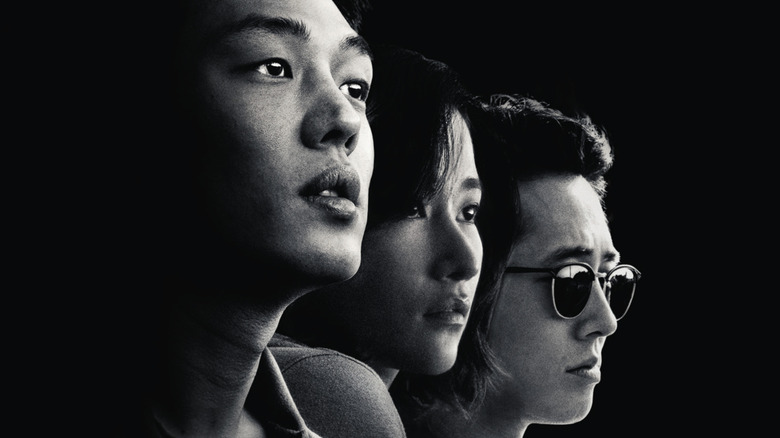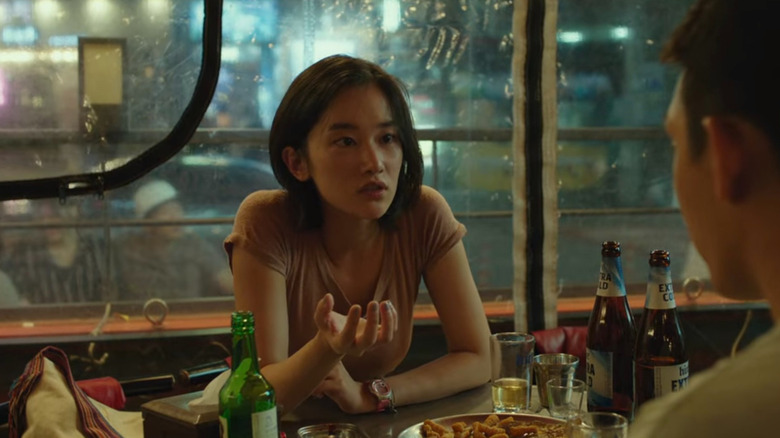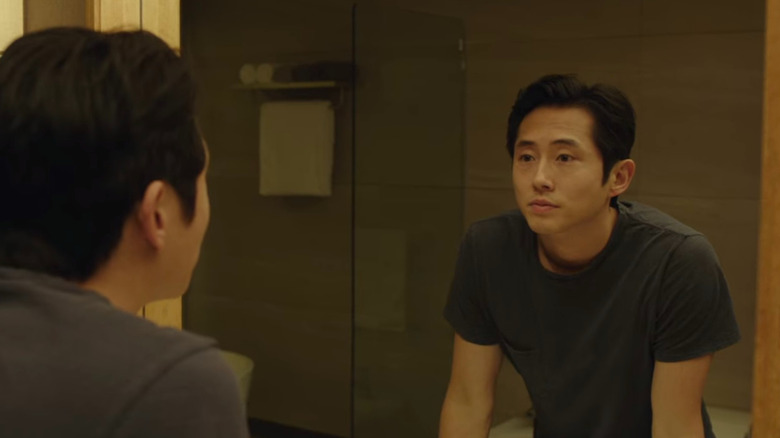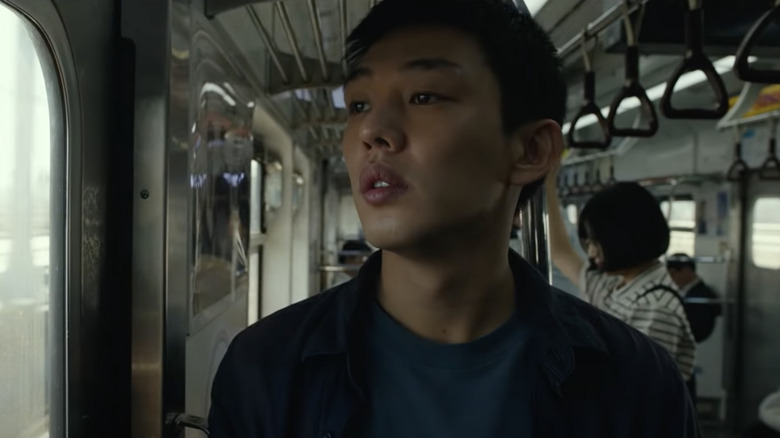The Daily Stream: Burning Funnels Life's Ambiguities Into A Simmering Psychological Thriller
(Welcome to The Daily Stream, an ongoing series in which the /Film team shares what they've been watching, why it's worth checking out, and where you can stream it.)
The Movie: "Burning"
Where You Can Stream It: Kanopy (Free), Pluto TV or Tubi (Free with ads)
The Pitch: An aspiring writer reconnects with a young woman he knew growing up, only to become mired in head games with her mysterious rich friend as she disappears without a trace.
In the wrong hands, ambiguity can be a cop-out and a crutch for weak storytelling. There are times when "open to interpretation" feels like code for "not a lot going on." While rewatching "Burning" this week, it occurred to me that part of the reason its narrative works so well and remains so tense and haunting is because, on one level, it's all about how we interpret life's ambiguities.
Rather than being foisted on us at the end, the audience is made to feel the same constant unease as the protagonist, Lee Jong-su (Yoo Ah-in), while he deals with the vagaries of other people in recognizable situations (such as a seeming love triangle, as opposed to other arthouse weirdness). The film is economical about the details it provides, giving just enough to tease the imagination. And the idea of unresolved questions — events to which we can only assign our own personal significance — goes along with its central theme.
"To me, the world is a mystery," Jong-su says.
Why it's essential viewing
In screenwriting, there's this idea that good dialogue should have subtext, such that the thing characters are talking about isn't really what they're talking about. "Burning" offers a masterclass in that. Rewatching it with knowledge of how the plot plays out brings that to the fore, as every interaction between characters takes on deeper meaning.
An example of this comes early in the film as Jong-su's dream girl, Shin Hae-mi (Jeon Jong-seo), pantomimes eating a tangerine and says things like, "Don't think that there is a tangerine here. Just forget that there isn't one. That's the key."
Is she talking about an invisible tangerine or something else? In the context of this 148-minute adaptation of a lean Haruki Murakami short story, it seems more like director Lee Dang-chong and his co-writer, Oh Jung-mi, are indirectly commenting on how we can love or hate the idea of a person, especially when they're not there. Jong-su catches on as Hae-mi invites him to cat-sit for her in an apartment with a litterbox where the actual feline proves elusive. "Am I coming here to feed an imaginary cat?" he asks.
The mind goes off in all different directions while watching "Burning," leaving the first-time viewer to wonder if Hae-mi — this unrecognizable childhood acquaintance of Jong-su's who claims to have had plastic surgery — is herself a pantomimed person, someone too good to be true.
From Glenn to Ben
Alone in an empty house, Jong-su hears the phone ring, but no one's there when he picks up. Outside, the sound of a disembodied voice making announcements fills the air, and only later do we learn that it's a North Korean propaganda broadcast. Likewise, when Jong-su first meets Ben (Steven Yeun), a superficial rival with "superior DNA" who claims to have "never shed a single tear" in his life, Ben is talking on the phone to a "Ms. Kim," but we only hear his side of the conversation. This leaves us to speculate and fill in the gaps on our own until Ben finally says "Mom" and firmly characterizes the nature of their relationship.
Steve Yeun is now well established as a film presence — most recently in Jordan Peele's "Nope" — but coming into "Burning," he was not so far removed from "The Walking Dead," where he played a nicer character, Glenn Rhee. Going from Glenn to Ben allowed Yeun to show off his acting range and antagonistic side, messing with Jong-su's mind and ours.
Hae-mi comes back from Africa with this guy, who is coy about his job, saying only, "I do this and that." We get the impression that she exists as a mere plaything for him and his well-to-do friends. In the kitchen, Ben also speaks of meals as "offerings" he consumes, as if he enjoys sacrificing living things.
By the time we get to the line, "Sometimes I burn down greenhouses," delivered by Ben in the dead of night, it's chilling because he's already talked openly about metaphors, and this seems like one heavy with meaning. As Jong-su goes around searching for literal greenhouses, it feels as though he's missing the point.
Burn my car
Earlier this year, "Drive My Car," a movie adapted from another Murakami short story, became the first Japanese film to score a Best Picture nomination at the Oscars. Prior to that, the two best-known Murakami movie adaptations, one of which is "Burning," came from Vietnamese and Korean directors. Filmmaker Trần Anh Hùng took a stab at bringing Murakami's bestseller "Norwegian Wood" to the big screen, but by dint of the very medium perhaps, the movie failed to capture the essential spark of the novel and its narrator's internal monologue.
By sheer coincidence, the first time I opened a book with Murakami's name on it and started reading, I happened to be standing in Kinokuniya Books, the same store in Shinjuku, Tokyo, where the author bought the pen and paper for his first novel. I quickly devoured "Hard-Boiled Wonderland and the End of the World" and several other Murakami novels, "Norwegian Wood" included, but it wasn't until after seeing "Burning" that I went back and read the short story "Barn Burning" from his collection "The Elephant Vanishes."
"Burning" showed that a great Murakami adaptation was possible and could go beyond its Japanese roots to gel with a Korean sensibility (similar to "Oldboy," itself adapted from manga) before finding even broader international appeal. As sad as it is, there's something universally relatable about being alone with your thoughts and a photo of someone who's not there. Jong-su fantasizes about Hae-mi while gazing outward from the window of a chilly, dark room, and it's not so different from the imagined scenarios of online life — or the inner life that keeps us all marooned in our own separate heads, pondering who we allow to live rent-free there and what we infer from the walls of silence that surround us.
Simultaneous existence
In one of the final scenes of "Burning," the camera pulls back to show the city of Seoul outside Jong-su's small writing window. That's an image that hit home for me as I was watching the movie while settling back into my own writing groove after a vacation, where I rediscovered life outside the computer cave elsewhere in Asia.
Ben talks of "simultaneous existence," how he can be here and there at the same time. Because he is young and inexplicably wealthy, Jong-su likens him to a Korean Great Gatsby. Murakami has translated "The Great Gatsby" and other F. Scott Fitzgerald novels into Japanese, and Fitzgerald himself famously said, "The test of a first-rate intelligence is the ability to hold two opposing ideas in mind at the same time and still retain the ability to function."
"Burning" is a first-rate Schrödinger's cat of movie that supports multiple interpretations, which are not mutually exclusive (though one of them might involve a serial killer adopting a non-hypothetical cat named Boil). As I see it, there are two likely scenarios for what really happened to Hae-mi, but the movie keeps you guessing and which scenario seems more likely changes from moment to the next.
It's possible that Jong-su's final encounter with Ben only occurs in the book he's now writing, but just because he's one of those writer protagonists — written by writers for themselves — doesn't mean his story only holds application for that type of person. In a time when it's all too easy for folks to ghost each other or start seeing hidden "Magic Eye" pictures in the unresponsive internet void, "Burning" is a movie about the phantom motives we attribute to people and the phantom relationships we form with them in our heads.




